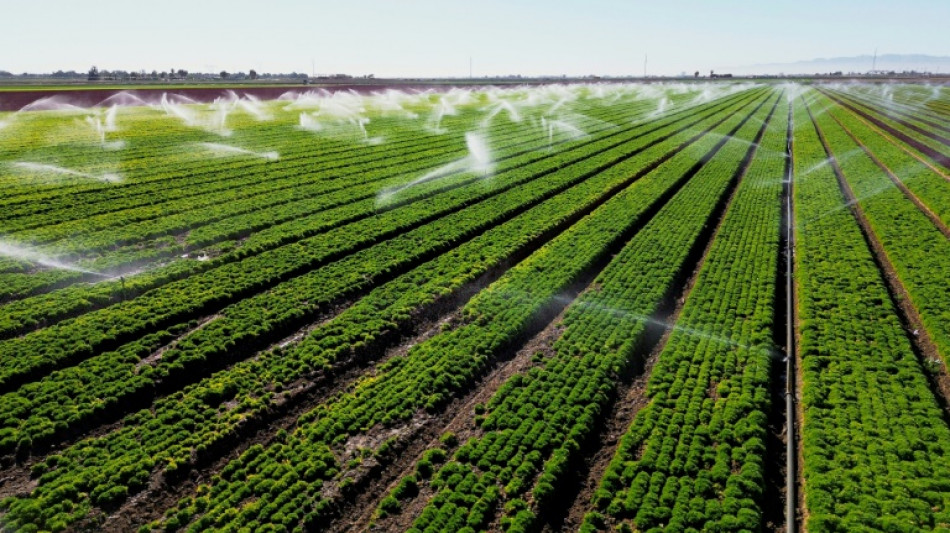
-
 Leipzig lose more ground on Bayern with Hoffenheim loss
Leipzig lose more ground on Bayern with Hoffenheim loss
-
Arsenal back to winning ways, Chelsea up to third in Premier League

-
 Sinner powers Davis Cup holders Italy past Australia to final
Sinner powers Davis Cup holders Italy past Australia to final
-
Andy Murray to coach Novak Djokovic

-
 Leipzig lose ground on Bayern, Dortmund and Leverkusen win
Leipzig lose ground on Bayern, Dortmund and Leverkusen win
-
Fear in central Beirut district hit by Israeli strikes

-
 Chinese film about Covid-19 wins Taiwan's top Golden Horse prizes
Chinese film about Covid-19 wins Taiwan's top Golden Horse prizes
-
Tuipulotu puts anger behind him as he captains Scotland against native Australia

-
 Inter smash Verona to take Serie A lead
Inter smash Verona to take Serie A lead
-
Mass rape trial sparks demonstrations across France

-
 Lebanon says 15 killed in Israeli strike on central Beirut
Lebanon says 15 killed in Israeli strike on central Beirut
-
Eddie Jones will revel in winding up England - Genge

-
 Chelsea see off Leicester on Maresca's King Power return
Chelsea see off Leicester on Maresca's King Power return
-
Storms bring chaos to Ireland, France, UK

-
 Berrettini gives Italy edge on Australia in Davis Cup semis
Berrettini gives Italy edge on Australia in Davis Cup semis
-
Amber Glenn storms to gold in Cup of China

-
 High-flying Chelsea see off Leicester
High-flying Chelsea see off Leicester
-
Climate-threatened nations stage protest at COP29 over contentious deal

-
 Families fleeing after 32 killed in new sectarian violence in Pakistan
Families fleeing after 32 killed in new sectarian violence in Pakistan
-
Ancelotti says 'ugly' to speculate about Mbappe mental health

-
 Failure haunts UN environment conferences
Failure haunts UN environment conferences
-
Colapinto in doubt for Las Vegas GP after crashing

-
 Lebanon says 11 killed in Israeli strike on central Beirut
Lebanon says 11 killed in Israeli strike on central Beirut
-
Three arrested in Spain for racist abuse at Liga Clasico

-
 Pope to skip Notre Dame opening for Corsica visit
Pope to skip Notre Dame opening for Corsica visit
-
Tokyo police care for lost umbrellas, keys, flying squirrels

-
 Neuville closes in on world title after Rally Japan recovery
Neuville closes in on world title after Rally Japan recovery
-
Jaiswal slams unbeaten 90 as India seize control against Australia

-
 'Nice surprise' for Verstappen to edge Norris in Las Vegas GP qualifying
'Nice surprise' for Verstappen to edge Norris in Las Vegas GP qualifying
-
Indian teen admits to 'some nerves' in bid for world chess crown

-
 Patrick Reed shoots rare 59 to make Hong Kong Open history
Patrick Reed shoots rare 59 to make Hong Kong Open history
-
Record-breaker Kane hits back after England criticism

-
 Cameron Smith jumps into lead at Australian PGA Championship
Cameron Smith jumps into lead at Australian PGA Championship
-
Russell on pole position at Las Vegas GP, Verstappen ahead of Norris

-
 Philippine VP made 'active threat' on Marcos' life: palace
Philippine VP made 'active threat' on Marcos' life: palace
-
Celtics labor to win over Wizards, Warriors into Cup quarters

-
 Balkans women stage ancient Greek play to condemn women's suffering in war
Balkans women stage ancient Greek play to condemn women's suffering in war
-
Nvidia CEO says will balance compliance and tech advances under Trump

-
 Grand Slam ambition dawning for Australia against Scotland
Grand Slam ambition dawning for Australia against Scotland
-
Japan game set to leave England with more questions than answers

-
 Amorim's to-do list to make Man Utd great again
Amorim's to-do list to make Man Utd great again
-
What forcing Google to sell Chrome could mean

-
 Fears for Gaza hospitals as fuel and aid run low
Fears for Gaza hospitals as fuel and aid run low
-
Anderson to Starc: Five up for grabs in IPL player auction

-
 Big money as Saudi makes foray into cricket with IPL auction
Big money as Saudi makes foray into cricket with IPL auction
-
Budget, debt: Trump's Treasury chief faces urgent challenges

-
 Trump names hedge fund manager Scott Bessent as Treasury chief
Trump names hedge fund manager Scott Bessent as Treasury chief
-
Putin vows more tests of nuke-capable missile fired at Ukraine

-
 Yin avoids penalty to keep lead as Korda charges at LPGA Tour Championship
Yin avoids penalty to keep lead as Korda charges at LPGA Tour Championship
-
With favourites out MLS playoffs promise more upsets


California's desert farmers defend their river rights
A blanket of crops covers the floor of the Imperial Valley in southern California, a patchwork of vibrant greens given life by the Colorado River in a landscape bleached by the desert sun.
But as a decades-long drought desiccates the US West and the once-mighty river dwindles, questions are being asked about why a handful of farmers are allowed to take as much water as all of Nevada and Arizona combined.
"We average less than two inches (five centimeters) of rainfall per year," fourth generation farmer Andrew Leimgruber told AFP.
"So without the supply of Colorado River water coming here, there would be no one living here, there'd be nothing being grown here, this would be a desert."
The valley, along with Yuma in Arizona, is a vital part of America's huge agricultural sector, producing most of the vegetables the United States eats over winter, in a business that generates around $2 billion a year.
Farmers here also grow alfalfa, a forage crop supplied to beef and dairy ranchers.
- Ancient agreement -
The land here has always been fertile, but it's always been dry.
The pioneers who forged the West realized that with its permanent sunshine, Imperial Valley could produce crops year-round to feed a growing population, as long as they could keep the fields watered.
Their solution was to build an 80-mile (130-kilometer) canal from the Colorado River, positioning themselves at the head of the queue for the rights to that river.
An agreement hashed out over a century ago allows Imperial Valley farmers to use 3.1 million acre-feet of water every year -- about 70 percent of all the water California is allowed to take.
An acre-foot refers to an acre covered in water a foot deep, which equals some 326,000 gallons (1.23 million liters) or about half an Olympic-size swimming pool.
But as human-caused climate change worsens a drought that has now lasted more than two decades, the river is struggling to keep up with demand.
The 40 million people in the West who rely on it, including in some of America's biggest cities, are being told they need to cut back.
Residents of Los Angeles last year faced fines for watering their gardens too often, and are urged to take only short showers instead of baths.
The predicament has pitted suburban homeowners surveying their brown lawns against nearby farmers.
"As the largest water user on the river, we become a target because it becomes an easy solution," says Tina Shields of the Imperial County Irrigation District.
"We're not going to sacrifice our community for urban sprawl and urban development and other areas."
In any case, says Shields, many of the people who complain about farmers using water are happy to fill their refrigerators with the food they produce.
"We grow a half million acres a year of crops that feed our nation and other nations as well. So it's critical to our community and our economy in particular."
- 'No lack of work' -
Despite its water wealth, Imperial County is one of the poorest in California and would struggle to survive without agriculture.
Rural workers, mostly Latinos, come from a wide area, including across the Mexican border several dozen miles away, to earn money in the fields.
"There has been no lack of work here," says Ramon Cardenas, who has toiled for three decades under summer temperatures that regularly top 100 degrees Fahrenheit (38 degrees Celsius).
Some farmers have cut deals with power generation companies, signing long-term leases that see crops replaced by solar panels.
They might not be using water anymore, but neither are they offering work.
Cardenas hopes the trend won't spread.
"We depend on this," he says gesturing to the crew picking lettuce.
- Productive land -
Despite a very wet California winter, Imperial Valley hasn't gotten much rain this year.
As Leimgruber's sprinklers spray hundreds of liters (gallons) of water onto a field, he insists it is well used.
Even thirsty alfalfa -- around 15 percent of which he says is exported -- is vital for a country that consumes so much meat and dairy, he says.
"California is the top dairy-producing state in the country, and that's because of the Imperial Valley's ability to plant alfalfa," he says.
"A lot of Americans don't think it's possible to see empty shelves, and it's areas like this that ensure the country is fed and I think that has to be protected."
And, he insists, if Imperial Valley didn't produce the alfalfa, other suppliers would simply step in and fill the void.
Why, he questions, should he and his fellow farmers miss out on that?
"People don't understand how productive this land is," he says.
L.Janezki--BTB


